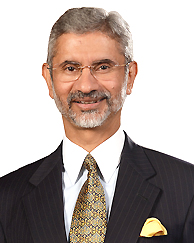NEW DELHI – As the Modi government completes nine years in office, foreign policy would certainly be among the domains where it has made an impact. This is increasingly recognised by the world and in India itself. It is visible in its new approaches like Neighbourhood First and SAGAR, mechanisms like Quad and I2U2 and initiatives such as the International Solar Alliance. India is perceived as a responsible development partner, a First Responder, and a voice of the Global South. Each of these aspects reflects a quest towards becoming a leading power.
India’s rise takes place in a volatile and uncertain world. The turbulence of our era will not only have to be managed, but where possible even leveraged. Ongoing conflicts and big power competition determine the larger landscape. Indian diplomacy has responded through optimal positioning vis à vis the major power centres, less by hedging and more through active pursuit of interests and values. Our independence of policy and action has been a defining characteristic. In these nine years, many key partners have also witnessed radically different administrations. Yet India has ensured the trajectory of partnerships that remains consistently positive.
The Covid pandemic is the transformational event of our times. It highlighted the economic concentration and its ensuing vulnerabilities that characterise globalisation. Forging reliable and resilient supply chains is therefore a key to de-risking. India seeks to participate in that endeavour through Make in India, PLI schemes and Gati Shakti. PM Modi’s foreign policy focuses on exploring global opportunities, building deep strengths, absorbing technology and best practices, and expanding employment.
Our growing digital existence has brought to the fore concerns of trust and transparency. Critical and emerging technologies are gaining salience by the day. This is particularly so in regard to communication, mobility, energy and health. New domains of competition are also visible, enabled by radical breakthroughs in diverse fields. As the knowledge economy encounters demographic constraints, Indian talent is a powerful card. Fostering trusted collaboration and making technology choices are consequently of utmost importance.
Envisaging a global workplace, the Modi government has concluded numerous mobility agreements, ensured fair-play for our professionals and students abroad, while securing them in times of distress. The Vande Bharat Mission and Operations Ganga andKaveri are recent reminders.
India is today the most populous nation; the fifth largest economy and growing. But its greater influence comes from the power of ideas and initiatives. Whether it is climate action or counter-terrorism, connectivity or maritime security, financial inclusion or food security, India has actively shaped discussions and outcomes.
The Coalition for Disaster Resilient Infrastructure, International Year of Millets and Lifestyle for Environment (LiFE) are notable expressions. Much of how India influences the world is through its own policies and delivery. When we ensure digital public goods and plug leakages, promote renewables and encourage energy efficiency or produce vaccines on scale and create a massive safety net, these are examples for others.
A willingness to share has also gained deep global appreciation. Vaccine Maitri, which made us the source for almost 100 nations, created abiding goodwill. On a more recurring basis, 600 development projects spanning 78 nations testify to our internationalism. And not least, India’s emergence as a First Responder in disaster situations like Turkiye recently underlines its capabilities.
India’s expanding diplomatic footprint reflects its growing interests. Vital partners need to be engaged continuously and intensively, but others too deserve attention. The frequency and expanse of high-level interactions has been widely welcomed by our partners. This is as true of immediate neighbours like Sri Lanka and Nepal as in the Gulf, or indeed in Africa, Europe or Latin America. Creating collective formats such as with the Pacific Islands, Caribbean community, Nordic nations or Africa has imparted a sustainable efficiency to the process.
Foreign policy begins on our borders and understandably, that has seen the greatest transformation. A generous and non-reciprocal approach to immediate neighbours has been backed by vastly improved project delivery. As a result, regionalism in South Asia is making rapid strides, reflected in new road, rail and waterway connectivity, power grids, fuel pipelines and border crossing facilities. Improvements in the hard infrastructure have been matched by arrangements to facilitate flow of goods and services. A shared response to the Covid challenge has also strengthened a sense of solidarity. India’s support for Sri Lanka during its economic crisis has had a strong resonance as well.
While development has been the main focus, challenges that emerged to our national security have been countered firmly. This includes the robust military deployment in our border areas to ensure that the status quo is not unilaterally altered by China. And a set of policies and actions to delegitimise and respond to cross-border terrorism from Pakistan.
An India that is more Bharat takes greater pride in its heritage and traditions. Their expression at the international stage is essential to multipolarity and indeed, to India’s rise. The celebration of yoga and propagation of ayurveda are important beginnings as also the creation of a lexicon. The broader goal of promoting a better global understanding of India’s perspectives and beliefs is work in progress.
On Day 1, at the time of taking office, PM Modi made clear his commitment to a bolder foreign policy that would overcome hesitations and go beyond dogma. He has focused on building greater capabilities, assuming more responsibilities and shaping the big issues of our day. As we enter Year 10, that journey continues.
This article first appeared in Times of India.

